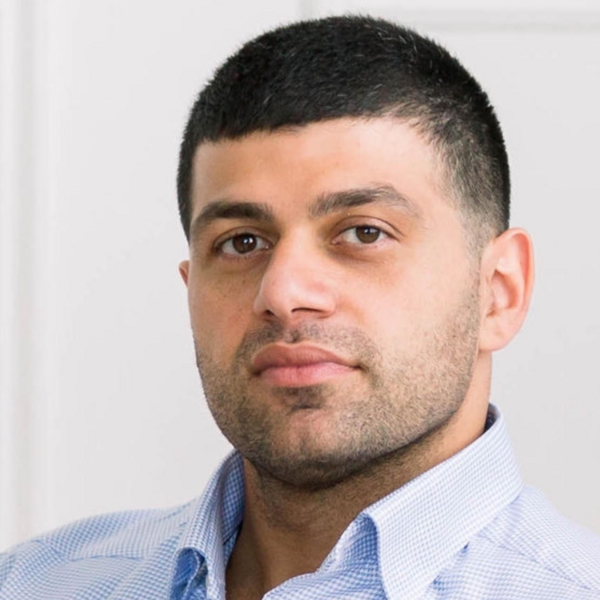Breadcrumbs
- Home
- About Us
- Latest News
- Faculty Spotlight: Meet Dr. Arash Jaberi
Faculty Spotlight: Meet Dr. Arash Jaberi

The University of Toronto’s Department of Medical Imaging has long been at the forefront of radiology innovation and training, including developing and fostering residencies and fellowships to address gaps in existing medical imaging services and care. One of those areas is in Vascular & Interventional Radiology, which Division Head of Dr. Arash Jaberi hopes to develop through comprehensive fellowships and residencies.
Starting his formal education by completing his Honours Bachelor of Science at UofT, majoring in physiology and minoring in chemistry and biology, Dr. Jaberi received his Medical Doctorate from UofT in 2010 before completing Diagnostic Imaging Residency in 2015 at the University of Ottawa. After residency, Dr. Jaberi completed a fellowship in Vascular and Interventional Radiology at UofT.
While he was conducting vascular research at St. Michael’s Hospital while completing his BSc, Dr. Jaberi was able to get front row access to the hospital’s angioplasty suite while working with a nephrologist, Dr. Sandra Donnelly.
“Getting access to the hospital’s medical imaging department and seeing first hand the challenges and prospects with diagnostics and new technology really influenced me to pursue radiology,” he says. “I also really enjoyed the level of patient interaction, specifically in interventional radiology, and so that’s where I decided to take my career.”
Dr. Jaberi completed his Fellowship with the Joint Department of Medical Imaging (JDMI) at University Health Network’s (UHN) Mount Sinai Hospital before he was hired on as permanent staff. It was at this time he decided to get his Masters of Education. “I had found my education to be a very fruitful experience for me, and I really wanted to be a part of continuing and growing that education for future radiologists.”
Now, Dr. Jaberi has carved out a niche for himself that he continues to enjoy, particularly working at a teaching hospital. “The most rewarding part has been seeing medical students, residents and fellows throughout their training, developing new skills and becoming more confident in their abilities.”
Vascular and interventional radiology is constantly evolving and reaching new frontiers, which is of particular interest to Dr. Jaberi as he continues to work and teach in the field. From prostate artery embolization, balloon pulmonary angioplasty and advanced aortic intervention to sclerotherapy and gynecological issues like fibroid embolization, Dr. Jaberi can see the vast difference in advancements and services provided in interventional radiology in the last 20 years.
“Being at the forefront of advancements made in this field that could be applied to patients who historically didn’t have as many options, or could have had more severe complications or outcomes, has been so interesting and encouraging for me,” he recalls. “And as there are more technology advances in radiology, we’re seeing more and more services rely on us to help care for their patients.”
The spectrum of services offered in interventional radiology are already vast, and the field seems to keep expanding. For this reason, many interventional radiologists will specialize or subspecialize in a particular domain, including Dr. Jaberi, who specializes in hepatic vascular interventions, an area that includes complex procedures like transjugular intrahepatic portosystemic shunts (TIPS).
Due to the intense specialization of procedures like TIPS, prostate embolization and balloon pulmonary angioplasty, many services are only provided at specific medical imaging centres, with very few of these centres existing nationwide. The radiology centre at UHN/Mount Sinai is one of those, and it also provides a robust oncological intervention practice through the hospital’s affiliation with Princess Margaret Hospital Cancer Centre.
MI’s Vascular and Interventional Radiology Fellowship takes on an average of 6-7 fellows annually, both from Canada and abroad, who learn vital radiology skills to bring back to their hospitals and practices. “Through this robust clinical practice, we’re able to transfer our knowledge to the next generation of radiologists so they can continue to do the work we’re so passionate about,” Dr. Jaberi says.
Looking forward, Dr. Jaberi is excited to see technology and hospital capacity continue to grow. “Our practice at Mount Sinai has doubled as we have advanced interventional suites, and we’re renovating the angioplasty suites at UHN,” he explains. “So, we’ll be getting four new state-of-the-art angioplasty suites at Toronto General Hospital, two of which are CT/Fluoroscopy hybrids, and two new state-of-the-art angioplasty suites at Toronto Western Hospital, one of which is a CT/Fluoroscopy hybrid.” Overall, he’s excited to see improvements to patient care and minimally invasive care for different patient populations.
Dr. Jaberi is currently a staff radiologist at University Health Network and Mount Sinai Hospital; Division Lead, Vascular & Interventional Radiology, JDMI; and Assistant Professor in UofT’s Medical Imaging Department. He’s received numerous awards and honours, most recently receiving several faculty awards from Medical Imaging including Outstanding Teachers in the Fellowship Program in 2022 and 2021; Outstanding Teachers in the Residency Program in 2021, 2020 and 2018; Outstanding Faculty Mentor Award in 2019; and the Edward L. Landsown Award for Outstanding Teacher in the Residency Training Program in 2018. He has also received the Sinai Health System Award of Excellence in Education from Mount Sinai Hospital in 2018.